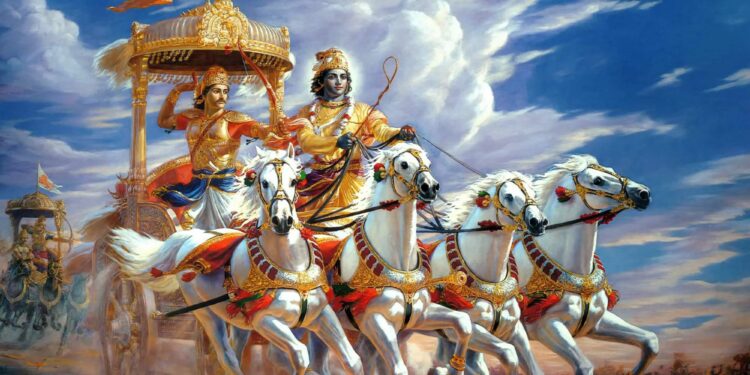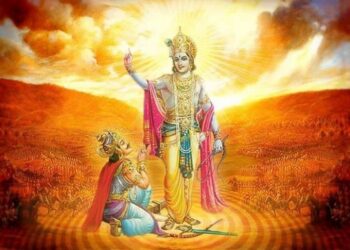TEXT 14
sarvam etad ṛtaṁ manye
yan māṁ vadasi keśava
na hi te bhagavan vyaktiṁ
vidur devā na dānavāḥ
SYNONYMS
sarvam—all; etat—this; ṛtam—truth; manye—I accept; yat—which; mām—unto me; vadasi—You tell; keśava—O Kṛṣṇa; na—never; hi—certainly; te—Your; bhagavan—O Personality of Godhead; vyaktim—revelation; viduḥ—can know; devāḥ—the demigods; na—nor; dānavāḥ—the demons.
TRANSLATION
O Kṛṣṇa, I totally accept as truth all that You have told me. Neither the demigods nor the demons, O Lord, can understand Your personality.
PURPORT
Arjuna herein confirms that persons of faithless and demonic nature cannot understand Kṛṣṇa. He is not known even by the demigods, so what to speak of the so-called scholars of this modern world? By the grace of the Supreme Lord, Arjuna has understood that the Supreme Truth is Kṛṣṇa and that He is the perfect one. One should therefore follow the path of Arjuna. He received the authority of Bhagavad-gītā. As described in the Fourth Chapter, the paramparā system of disciplic succession for the understanding of Bhagavad-gītā was lost, and therefore Kṛṣṇa reestablished that disciplic succession with Arjuna because He considered Arjuna His intimate friend and a great devotee. Therefore, as stated in our Introduction to Gītopaniṣad, Bhagavad-gītā should be understood in the paramparā system. When the paramparā system was lost, Arjuna was selected to rejuvenate it. The acceptance by Arjuna of all that Kṛṣṇa says should be emulated; then we can understand the essence of Bhagavad-gītā, and then only can we understand that Kṛṣṇa is the Supreme Personality of Godhead.
TEXT 15
svayam evātmanātmānaṁ
vettha tvaṁ puruṣottama
bhūta-bhāvana bhūteśa
deva-deva jagat-pate
SYNONYMS
svayam—personally; eva—certainly; ātmanā—by Yourself; ātmānam—Yourself; vettha—know; tvam—You; puruṣa-uttama—O greatest of all persons; bhūta-bhāvana—O origin of everything; bhūta-īśa—O Lord of everything; deva—deva—O Lord of all demigods; jagat—pate—O Lord of the entire universe.
TRANSLATION
Indeed, You alone know Yourself by Your own internal potency, O Supreme Person, origin of all, Lord of all beings, God of gods, Lord of the universe!
PURPORT
The Supreme Lord, Kṛṣṇa, can be known by persons who are in a relationship with Him through the discharge of devotional service, like Arjuna and his followers. Persons of demonic or atheistic mentality cannot know Kṛṣṇa. Mental speculation that leads one away from the Supreme Lord is a serious sin, and one who does not know Kṛṣṇa should not try to comment on Bhagavad-gītā. Bhagavad-gītā is the statement of Kṛṣṇa, and since it is the science of Kṛṣṇa, it should be understood from Kṛṣṇa as Arjuna understood it. It should not be received from atheistic persons.
As stated in Śrīmad-Bhāgavatam (1.2.11):
vadanti tat tattva-vidas
tattvaṁ yaj jñānam advayam
brahmeti paramātmeti
bhagavān iti śabdyate
The Supreme Truth is realized in three aspects: as impersonal Brahman, localized Paramātmā and at last as the Supreme Personality of Godhead. So at the last stage of understanding the Absolute Truth, one comes to the Supreme Personality of Godhead. A common man or even a liberated man who has realized impersonal Brahman or localized Paramātmā may not understand God’s personality. Such men, therefore, may endeavor to understand the Supreme Person from the verses of Bhagavad-gītā, which are being spoken by this person, Kṛṣṇa. Sometimes the impersonalists accept Kṛṣṇa as Bhagavān, or they accept His authority. Yet many liberated persons cannot understand Kṛṣṇa as Puruṣottama, the Supreme Person. Therefore Arjuna addresses Him as Puruṣottama. Yet one still may not understand that Kṛṣṇa is the father of all living entities. Therefore Arjuna addresses Him as Bhūta-bhāvana. And if one comes to know Him as the father of all the living entities, still one may not know Him as the supreme controller; therefore He is addressed here as Bhūteśa, the supreme controller of everyone. And even if one knows Kṛṣṇa as the supreme controller of all living entities, still one may not know that He is the origin of all the demigods; therefore He is addressed herein as Devadeva, the worshipful God of all demigods. And even if one knows Him as the worshipful God of all demigods, one may not know that He is the supreme proprietor of everything; therefore He is addressed as Jagatpati. Thus the truth about Kṛṣṇa is established in this verse by the realization of Arjuna, and we should follow in the footsteps of Arjuna to understand Kṛṣṇa as He is.

















